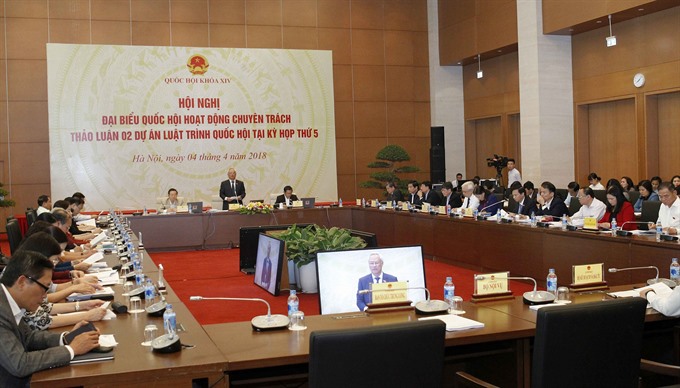 Politics & Law
Politics & Law

The latest revision on the draft law for special administrative and economic zones are considered to have properly absorbed feedback and made changes to several items including planning and special development mechanisms or organisation of the special zone’s government.
 |
| The National Assembly’s conference meeting on the two draft laws (Law on Special Administrative Economic Zones and the Law on Cyber Security) was held yesterday in Hà Nội. — VNA/VNS Photo |
HÀ NỘI — The latest revision of the draft law for special administrative and economic zones absorbed feedback and made changes to several items including planning and organisation of the special zone’s government, according to lawmakers.
Most National Assembly deputies agreed the revision was a positive step during yesterday’s meeting to review items to be submitted to the fifth plenary session of the 14th National Assembly.
The two draft laws selected to be reviewed yesterday were the law on special administrative-economic zones Vân Đồn, Bắc Vân Phong, Phú Quốc, and the law on cyber security, which according to the meeting’s president, NA Deputy Chairman Uông Chu Lưu, are two important and very technical laws that deal with modern concepts.
“This meeting was a chance for specialist NA deputies to contribute their wisdom to raising the quality of laws, helping bring high consensus when the final drafts are submitted to be passed in May,” he added.
In the morning session, one of the hottest discussions focused on whether to establish a counselling committee for special administrative zones.
According to the draft, State management of the special administrative zone’s People’s Committee, especially in ensuring that tasks given by ministries and agencies are completed, would be exerted via this counselling committee, which would be formed by the Prime Minister.
However, NA deputies expressed concerns that with high autonomy being the special administrative zone’s raison d’etre, this committee would slow the operation of the special zone’s authorities, and that more agencies is against the Government’s efforts to streamline administrative procedures.
NA deputy Phạm Thị Thu Trang from Quảng Ngãi Province said that currently the land law only provides for a maximum of 70-year term without mentioning any exceptions, permission to grant a 99-year land lease to ‘special projects’ in special administrative zones must be clarified and its impacts be assessed.
Cybersecurity concerns
Cybersecurity continues to receive widespread attention as a draft law is slated to be passed in May. Lawmakers are still split over how many restrictions should be in place.
The security and defence committee of the National Assembly, who played a key role in building the draft law, maintained the need for strict provisions to ensure national information security and the hasty passing of the law during a National Assembly (NA) meeting yesterday.
In the latest revision of the draft law on cyber security a controversial item which would require server localisation of internet companies, including multinational giants Google and Facebook, was removed.
However, as a compromise, foreign internet service providers would need to establish representative offices in Việt Nam. The offices will be responsible for addressing disputes as well as requests by the Vietnamese authorities to take down content deemed toxic or harmful. These foreign entities would also be forced to store the data of Vietnamese users inside Vietnam’s information infrastructure within the country’s territory.
According to a police report, by the end of January, Google and Facebook had rented 1781 and 441 servers from local Vietnamese companies, respectively.
Several NA deputies expressed disproval of these requirements, however, suggesting that they are ‘impractical,’ and go against modern technology trends and international practices. On top of this, concerns were voiced that the requirements might hinder business growth, and asked the draft committee to study alternative management policies.
Presiding the meeting, NA Deputy Chairman Đỗ Bá Tỵ, asked the draft committee to hold discussions with the ambassadors of several Western countries (US, Australia and the EU, amongst others) who had sent a joint-letter to the NA chief Nguyễn Thị Kim Ngân in last August expressing their concerns over proposed data localisation requirements, concluding that such requirements violate the WTO charter of which Việt Nam is a party.
Tỵ also expressed his concerns over the draft law’s current language regarding the provision for cyber commands. Cyber commands – defined as operations taking place in the cyberspace in order to protect national sovereignty, interests, and security, as well as social order – must be organised and conducted by the Ministry of Defence as a focal point, and considered a natural extension of traditional military operations, he argued.
The Ministry of Defence and the Ministry of Public Security must work together to clarify operations regarding cyber commands, as well as the responsibilities of each ministry.
Trần Thị Quốc Khánh, NA deputy from Hà Nội, said on behalf of many constituents and State authorities’ figures – herself included – opposed a separate cyber security law and called for a merging with the law on cyber information security instead. The law on cyber information security was completed in 2015 and went into effect in 2016, and the distinction between the two laws is not immediately clear when looking at the current draft text.
“I plead the National Assembly’s Standing Committee to ask the Government to hold off on this draft law, and if the two laws cannot be merged completely before the passing deadline in May, then the new unified cyber security law could be postponed to the next National Assembly session in 2019,” Khánh said.
The merging of the two laws could also mean fewer agencies to take care of cyber security and thus more efficient use of the country’s human and financial resources, she argued.
Concluding the meeting, NA deputy chairman Đỗ Bá Tỵ admitted cyber security law is a difficult subject where no consensus has yet been reached. The law must be exhaustive and consistent, but must not violate the rights of citizens and businesses, he said. — VNS




